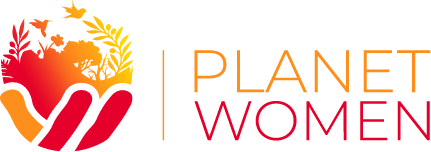Sources for Gender Equity Stats
WOMEN STRENGTHEN CLIMATE & CONSERVATION SOLUTIONS
A review of 17 studies from around the world showed that including women in conservation and natural resource governance resulted in stricter and more sustainable extraction rules, greater compliance with rules, greater transparency and accountability, and better conflict resolution.
Leisher, C., Temsah, G., Booker, F. et al. Does the gender composition of forest and fishery management groups affect resource governance and conservation outcomes? A systematic map. Environ Evid 5, 6 (2016).
https://environmentalevidencejournal.biomedcentral.com/articles/10.1186/s13750-016-0057-8
Data shows that a greater representation of women in government leads to stricter environmental laws and ultimately lower carbon emissions.
“Gender and climate change: Do female parliamentarians make difference?” Astghik Mavisakalyan, Yashar Tarverdi, European Journal of Political Economy, Volume 56, 2019, Pages 151-164, ISSN 0176-2680.
https://www.sciencedirect.com/science/article/pii/S0176268017304500
WOMEN ARE OFTEN THE PRIMARY USERS AND STEWARDS OF NATURE
Women are responsible for 80% of water collection in households where water is off the premises.
“Gender Equality in the 2030 Agenda: Gender-Responsive Water And Sanitation Systems” report from UN Women, published 2018.
Women produce about half of all food grown globally and up to 80% of food in the developing world, including harvesting crops and taking care of livestock.
“Women produce up to 80% of food in developing countries,” by Vikki Davies for Slowfood. Published in 2023.
https://fooddigital.com/articles/women-produce-up-to-80-of-food-in-developing-countries
Women do the majority of cooking for families around the world. They are responsible for the majority of grocery shopping or food collection, and they spend more of their money on food.
Julia A. Wolfson, Yoshiki Ishikawa, Chizuru Hosokawa, Kate Janisch, Jennifer Massa, David M. Eisenberg, “Gender differences in global estimates of cooking frequency prior to COVID-19,” Appetite, Volume 161, 2021, 105117, ISSN 0195-6663.
https://www.sciencedirect.com/science/article/pii/S0195666321000258#bib1
“Among U.S. couples, women do more cooking and grocery shopping than men,” by Katherine Schaeffer.
Women and girls are largely responsible for fuel collection globally, especially fuel for cooking and lighting the home.
M. Njenga, J.K. Gitau, R. Mendum, “Women’s work is never done: Lifting the gendered burden of firewood collection and household energy use in Kenya,” Energy Research & Social Science, Volume 77, 2021, 102071, ISSN 2214-6296.
https://www.sciencedirect.com/science/article/pii/S221462962100164X
WOMEN LEADERS IMPROVE PEACEMAKING OUTCOMES & COMMUNITY WELLBEING
“Reimagining Peacemaking: Women’s Roles in Peace Processes,” by Marie O’reilly, Andrea Ó Súilleabháin, And Thania Paffenholz. Report published 2015 for International Peace Institute
https://www.ipinst.org/wp-content/uploads/2015/06/IPI-E-pub-Reimagining-Peacemaking-rev.pdf
IMPROVING WOMEN’S EDUCATION AND ECONOMIC STATUS REDUCES POVERTY AND IMPROVES CHILDREN’S HEALTH
Increased income in the hands of women contributes not only to eliminating poverty, but also to better education, nutrition and health outcomes for children and other members of the household.
Rui GU, Feng-ying NIE, “Does empowering women benefit poverty reduction? Evidence from a multi-component program in the Inner Mongolia Autonomous Region of China,” Journal of Integrative Agriculture, Volume 20, Issue 4, 2021, Pages 1092-1106, ISSN 2095-3119.
https://www.sciencedirect.com/science/article/pii/S2095311920634360
Children born to a mother with 12 years of education are 31% less likely to perish under the age of five, compared with children born to a parent with no education. The study also found that a mother’s education was almost twice as impactful as a father’s education with regards to reducing childhood mortality.
Mirza Balaj, PhD, Hunter Wade York, MPH, Kam Sripada, PhD, Elodie Besnier, MA, Hanne Dahl Vonen, Aleksandr Aravkin, PhD, et al., “Parental education and inequalities in child mortality: a global systematic review and meta-analysis,” The Lancet, Volume 398, Issue 10300, P608-620, August 14, 2021.
https://www.thelancet.com/journals/lancet/article/PIIS0140-6736(21)00534-1/fulltext
The UN has declared gender equity critical to achieving all 17 of the Sustainable Development Goals.
“Why Gender Equality Matters Across All SDGs,” an excerpt from UN Women’s global monitoring report “Turning Promises into Action: Gender Equality in the 2030 Agenda for Sustainable Development.”
